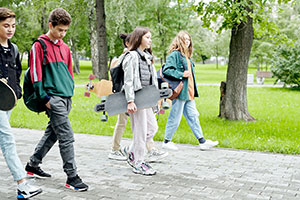
The “Safe Routes to School” (SRTS) and the Massachusetts Bay Transportation Authority (MBTA) pilot programs were the main topics at the recent meeting of the Somerville PTAC.
By Khoa Tong
The Somerville Pedestrian and Transit Advisory Committee held their monthly meeting on Thursday, April 20, hosted by Vitor Pamplona, vice-chair of PTAC. The goal of the meeting was to discuss plans for “Safe Routes to School” (SRTS) and the Massachusetts Bay Transportation Authority (MBTA) pilot programs.
“Safe Routes to School” is a federally funded program administered by MassDOT, aimed at providing resources to cities and schools to increase safe walking, biking and other forms of transit for public grade schools within the state.
Aside from the established state-run program, the city of Somerville also has a city based SRTS working group, which was founded in August 2022, operating under four main components that are programming, resources, streetscape changes and community engagement.
Greg Hanafin, transportation planner in the mobility division, serving as the liaison of the program, went over plans he has going forward. “The goal of the working group is to systematize city and school coordination, making sure that we’re all on the same page around safety, construction, programming and safety for students really being the focus,” he said.
As of now, the group has established in-school trainings for second grade pedestrian safety and fifth grade bike safety in addition to crossing guard, bike parking, transit pass and school bussing programs. “I was able to participate in a couple of the bike safety trainings this year, it was really fun to see how interested all of the students were and just excited to learn more about biking,” Hanafin said.
SRTS also recently launched their website that features walking and bike facilities maps, tips and ideas for starting family run walking school buses or bike trains. These resources are not exclusive for just schools, but they aim to create a one stop shop for families to plan out their effective commutes for students.
Hanafin said that the group is currently trying to standardize and pool together arrival and dismissal plans and policies to inform families on what they should be doing at those times based on their form of transportation. His hope is for that to be compiled into a one-to-two-page document and have schools distribute those out in the beginning of the upcoming school year.
The program over the past year has been gathering information during arrival and dismissal times through drone footage, on-ground observations, surveys as well as speed, volume and crash data. Hanafin mentions that with this knowledge, SRTS is gearing up to implement changes such as pavement markings and flex posts as well as long term changes including speed humps and even full street or sidewalk reconstruction in the coming future.
Finally, SRTS works with the schools to coordinate annual events such as the International Walk, Bike, and Roll to School Day in October. as well as the upcoming Massachusetts Walk, Bike, and Roll to School Day in May to push students to try a new method of getting to school. The program also continues to share updates directly through the schools as well as their mobility newsletter, but Hanafin expresses that this part of SRTS is the most underdeveloped one out of the four components.
Committee members, many of which are parents of students in primary schools, found the program to be helpful and exciting and brought up questions and suggestions regarding a shortage in crossing guards, construction, communication and alternative methods to gain engagement.
Hanafin addressed as many comments as he could, but with SRTS being relatively new much information is left to be developed. “This program in Somerville is still something that we are developing so I hope to continue to come in and speak to you all and hear feed so that we can continue and improve,” he said.
In the latter half of the meeting, PTAC members discuss the MBTA pilot pass programs. Lauren Craik, who is also a transportation planner in the mobility division, explains that the pilot pass program is looking to help low-income households who need to commute around the city.
In addition to the city’s “Student M7” pass, there are also three new pilot programs for parents and guardians, low-income residents as well as workforce passes. As of now, the pilot passes have hundreds of active cards and have shown themselves to be very effective in helping households, as seen through surveys sent out to users.
Laura concludes by stating that with these programs, data and information is being collected to make the case that they are beneficial in assisting those who need are affected by the passes.
Members wrapped up the meeting by briefly discussing general city updates such as a new code of conduct for board and committees, construction season for sidewalks, crosswalks and bike lanes, outreach for East Broadway bus service and crosswalk improvements and plans that are still open from prior months.
More information on PTAC, their projects as well as “Safe Routes to School” can be found on their respected websites at https://www.somervillema.gov/departments/somerville-pedestrian-transit-advisory-committee-ptac and https://somerville.k12.ma.us/district-departments/health-physical-education/safe-routes-school.















So if this PTAC is so concerned about pedestrians–why has it NEVER addressed the long-standing violations to pedestrian public safety posed by the cyclists on Business District sidewalks?
It’s been brought up with them before–but there reaction has always been, “Hunh? Whuzzat?”
Meanwhile, the sidewalk No-Cycling Decals have faded out yet again–and E-Bikes and scooters now ply the Business District sidewalks.
In this regard, pedestrian safety is off the radar for PTAC and City Hall.